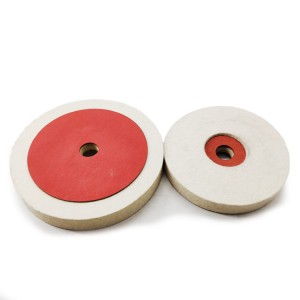With the global surge in the demand for new energy vehicles (NEVs), the race to optimize battery manufacturing processes has intensified. Amidst high – tech machinery and advanced materials, wool felt wheels are emerging as an unsung hero, playing a pivotal role in ensuring the precision and quality of key battery components.
In the production of lithium – ion batteries, which are the heart of most NEVs, surface finishing of battery electrodes is of critical importance. Even the slightest irregularity on the electrode surface can affect the battery’s performance, energy density, and lifespan. Wool felt wheels, with their soft and consistent texture, offer an ideal solution for polishing and smoothing these delicate surfaces. The fine wool fibers can gently remove burrs and uneven layers without causing damage to the sensitive electrode materials, ensuring a more uniform and efficient electrical contact.
For the manufacturing of battery casings, often made from lightweight yet durable metals or composites, wool felt wheels are used to achieve a high – quality finish. A smooth and blemish – free casing not only enhances the aesthetics but also improves the protection of the internal battery components. In addition, when applying protective coatings to battery casings, wool felt wheels can ensure an even distribution, enhancing the casing’s resistance to corrosion and wear. A leading NEV battery manufacturer reported that by incorporating wool felt wheels into their casing finishing process, they were able to reduce the failure rate of casings due to surface – related issues by 18%, significantly improving the overall reliability of their batteries.
Moreover, in the assembly process of battery packs, wool felt wheels are utilized for cleaning and preparing the surfaces of various components. The absorbent nature of wool can effectively pick up dust, debris, and tiny particles that could potentially interfere with the proper connection and operation of the battery pack. This meticulous cleaning process helps to prevent short circuits and other malfunctions, ensuring the safety and stability of the NEV’s power system.
However, the application of wool felt wheels in NEV battery manufacturing also comes with challenges. The battery manufacturing environment often requires strict control of humidity, temperature, and dust levels. Manufacturers need to ensure that the wool felt wheels do not introduce any contaminants into the production process. Additionally, as battery technologies continue to evolve, with the development of new materials and designs, wool felt wheel manufacturers need to keep innovating to meet the changing surface – finishing requirements.
As the new energy vehicle industry continues to grow at an astonishing pace, the role of wool felt wheels in battery manufacturing is set to become even more crucial. Their ability to provide precision, quality, and reliability makes them an indispensable part of the NEV battery production chain, contributing to the development of more efficient, safer, and longer – lasting electric vehicles.

Post time: Jun-05-2025
